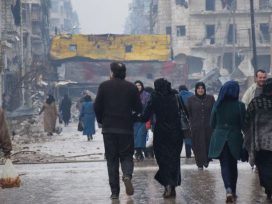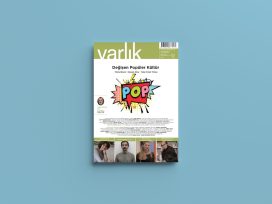The greatest gift of all
- Eurozine Review
4/2018
‘New Eastern Europe’ wonders whether Putin is bored; ‘Osteuropa’ recognizes the unfinished work of Arseny Roginsky; ‘Kultūros barai’ celebrates the Lithuanian miracle; ‘Varlik’ regrets the Islamization of Istanbul; ‘Esprit’ calls for more democracy at work; and ‘Syn og Segn’ talks about men, women and children.
New Eastern Europe (Poland) 2/2018
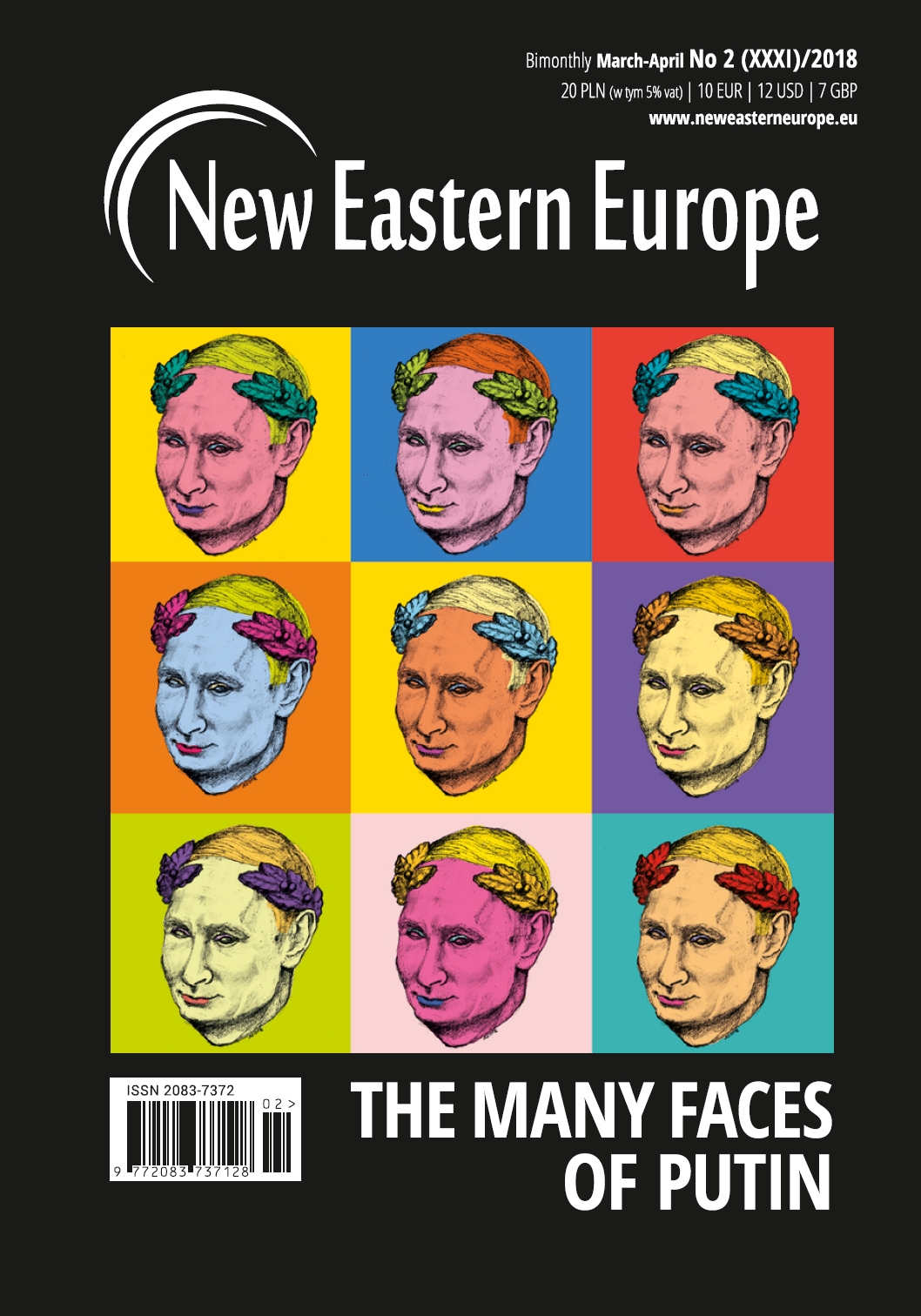
In a series of probing analyses, New Eastern Europe charts the prospects for Vladimir Putin, who was re-elected for a fourth term as president on 18 March and has now been in power longer than Leonid Brezhnev.
No way out? Mark Galeotti detects a sense of weariness – and not just among ordinary Russians: ‘The talk in Moscow is that Putin is bored with ruling Russia. This is reinforced by his lacklustre demeanour in public appearances as well as the minimalist nature of his election campaign.’
The president has a problem, Galeotti explains: ‘can Putin afford to become an ex-president? Conventional wisdom would say that he cannot; without being at the top of the system, he is at best vulnerable, at worst dead, and he knows it.’ But conventional wisdom might be wrong, thanks to the interests of those around Putin: ‘most systems are more benign and banal, especially when they are managed and governed by men and women who themselves do not fancy living in a Hobbesian world of murderous competition’.
New vision required: Konstantin Eggert turns a light on a major dilemma of Russia’s beleaguered opposition: Putin’s successful monopolization of foreign policy. Opponents can highlight corruption all they like, but ‘as soon as the critics of the Kremlin refuse to discuss Russia’s relations with the outside world, they immediately become ordinary soldiers of Putin’. However, Eggert predicts that ‘Putin’s fourth term will be a time of simmering political crisis that will eventually burst into the open’. The key to a successful outcome will be someone piercing today’s stagnation with ‘an attractive and realistic picture of the future’.
‘A ridiculous problem’: New Eastern Europe’s editor-in-chief Adam Reichardt sits down with Macedonia’s reformist prime minister, Zoran Zaev, who took over in July last year after a period of major upheaval. Zaev strikes a conciliatory note when it comes to his country’s long-running dispute with Greece over what it should be called: ‘After 23 years, it is a kind of a ridiculous problem, but it exists and it is not easy for Greece.’ He also restates his commitment to joining Nato, a goal that he says 80 per cent of Macedonians support, and stresses that the western Balkans is now safe for investors – and its own people.
More articles from New Eastern Europe in Eurozine; New Eastern Europe’s website
Osteuropa (Germany) 11–12/2017
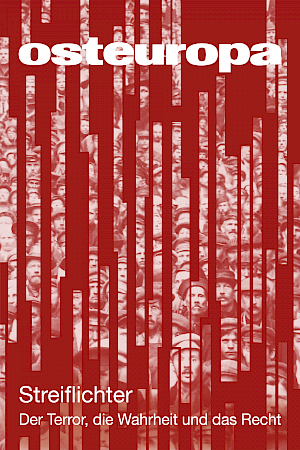
Osteuropa dedicates an issue to Arseny Roginsky – the historian, dissident and co-founder of the NGO Memorial – who died at the end of last year. As Wolfgang Eichweide writes, it was Roginsky’s work in opening up the Soviet archives before and immediately after the collapse of the Soviet Union that, alongside the creation of Memorial, was his major achievement.
As a historian, Roginsky specialized in the persecution of the Socialist Revolutionary party after 1917. In 1981, he himself was sentenced to four years in a camp for ‘illegal use of libraries and archives’. Among the texts by Roginsky published in the issue is the transcript of his statement to the court, first published in December 1981 in the tamizdat journal Russkaya Mysl. In it, Roginsky described the bureaucratic hurdles placed in the way of researchers seeking access to public archives in the late Soviet Union:
‘This system of “application”, “special storage” and “restricted use”, and the random decision-making by the archive authorities as to what the researcher is issued with and what not – all this limits the number of works based on unpublished material, narrows the problems to be researched, and hinders all those who conduct scientific work independently of the plans approved by some or other authority. Ultimately, the whole issue of restricted access to authentic sources, to genuine historical information, creates a comfortable basis for the untrue and even deliberately falsified interpretation of the Russian historical process.’
Back in the USSR: The opening of the archives begun during the 1990s has gone into reverse, reports Nikita Petrov, a historian at Memorial in Moscow specializing in the Soviet security services. In particular, access to the archive of the KGB remains extremely limited and unregulated. ‘Release of documents serves the interests of the secret services alone’, writes Petrov. Declassified documents are used ‘not only to exonerate the predecessor organizations when it comes to their services in the fight against “enemies of the fatherland”, but also to strengthen Russia’s new ideological doctrine.’
More articles from Osteuropa in Eurozine; Osteuropa’s website
Kultūros barai (Lithuania) 2/2018
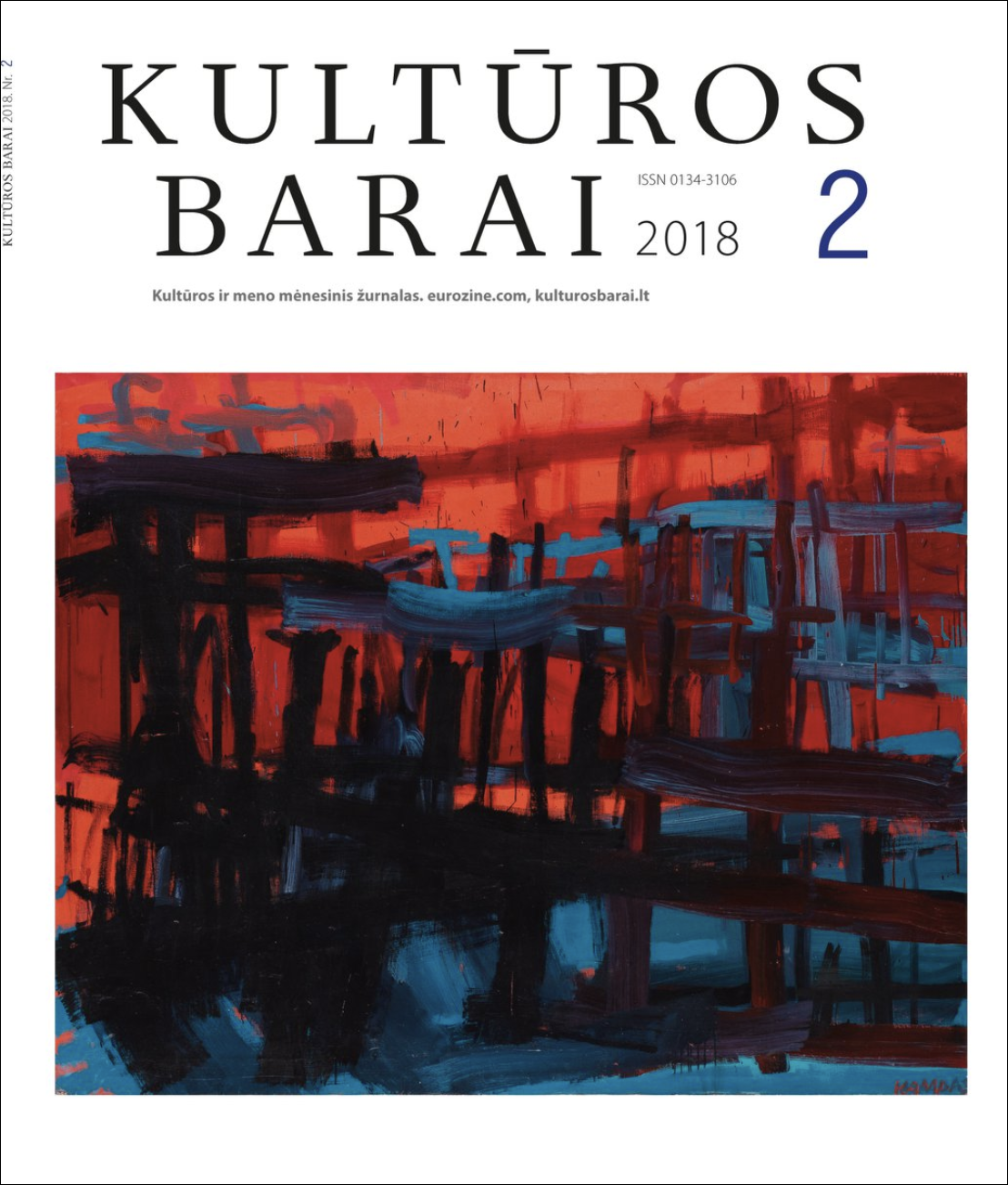
In Kultūros barai, Algirdas Grigaravičius opens a series celebrating the centennial of the restoration of the Lithuanian state. He quotes the historian Zenonas Ivinskis, writing in 1968 and reflecting back on 1918: ‘A “miracle” was needed. Both the warring dynasties, the Romanovs (Nicholas II) and the Hohenzollerns (Wilhelm II) … had now themselves been knocked off their thrones. Abandoned by the god of war, these states were drowning in waves of revolution. The military success of either … would have been the main barrier for the desire of the Lithuanians, Latvians and Estonians to achieve independence.’ The Germans, who came into Lithuania in 1915 after the Russian withdrawal mostly saw Lithuania the same way as Germany’s Chief of Staff of the Eastern Front Max Hoffmann, who wrote that the Lithuanian nation was as capable of ruling itself as his six-year-old daughter was of bringing herself up.
The spirit of Lithuania in the early twentieth century was largely formed by journal editors, writes Grigaravičius. Many future leaders of the state had spent time in America and, after acquiring useful experience there, returned to publish periodicals. At a meeting of activists in 1917, less than a year before the Lithuanian Act of Independence, a Franciscan friar posited monarchy as the best form of government to prevent a Jew from being elected president of Lithuania. A Lithuanian estate owner responded that Lithuania was going to be a free country, and if a Jew was deserving, then why not elect him. The most applause was received by the comment: ‘Lithuania has been oppressed over the ages … But Lithuania has never done the least harm to any nation … Therefore God should finally grant Lithuania the greatest gift of all – independence!’
Hate speech: Lithuania already has laws against hate speech, however Vytautas Daujotis warns against a rush to ban anything and everything that might be defined as such. History shows the consequences: in the Soviet Union free speech was banned under the pretext of protecting the state against slander, while in Weimar Germany laws introduced to curb the racist rhetoric of the Nazis only encouraged support for Hitler and his followers. In the present day, the conviction of Geert Wilders of incitement had a similar effect.
More articles from Kultūros barai in Eurozine; Kultūros barai’s website
Varlik (Turkey) 3/2018
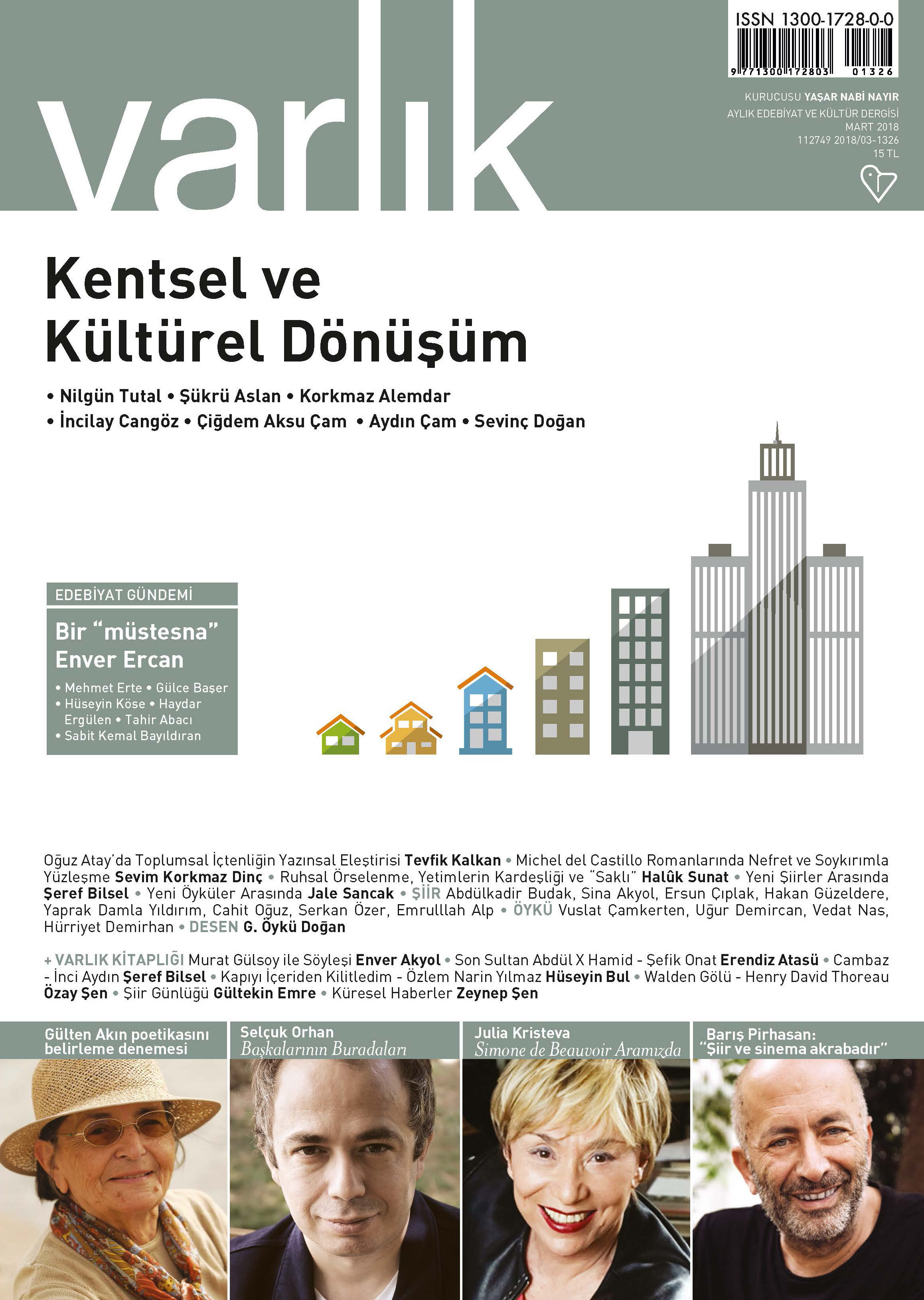
The March issue of Varlık attempts to understand the cultural agendas that are shaping Turkey’s urban landscape, from the palimpsest of Istanbul to the capital Ankara, and from the charms of the western university city of Eskişehir to the fierce commercial energy of Adana, sweltering on the Mediterranean.
Istanbul: Nilgün Tutal shows how the AKP government has used Istanbul as a global showpiece, shaping it into a paradigm of Islamic and Turkish modernity. While the city’s westernized elites shared the government’s ambition to equip Istanbul with the infrastructure of a modern commercial centre, when it comes to the city’s heritage they differ widely. For the AKP, ‘the ethnic, religious and cultural heritage of Byzantium and Constantinople was seen an inheritance to be placed under the sovereignty of political Islam,’ writes Tutal. Constructions such as the giant Çamlıca Mosque overlooking the Bosphorus are an illustration of this policy, as is the attempt to erase symbols of Republican Turkey such as the Atatürk Cultural Centre and the Beyoğlu Cinema.
Ankara: If Istanbul’s development has ideological motives, writes Korkmaz Alemdar, Ankara’s changes are the result of incompetence, greed and a disregard for planning laws. The damage done to the city during the twenty-five-year tenure of outgoing mayor Melih Gökçek has been immense, according to Alemdar. Gökçek ‘had a peculiar understanding of a city. Less about the places where people live and more about where they park … Melih Gökçek’s city is a city in which people live in multi-storey apartment blocks and spend their time in shopping malls’.
Eskişehir and Adana: İncilay Cangöz reports from Eskişehir, a university city halfway between Istanbul and Ankara. There, development has been much more positive. Eskişehir has absorbed waves of refugees and changing industries, yet still managed to create spaces that offer ‘partial escapes from the central Anatolian plain and the agenda that exhausts the country’. From Adana, Ciğdem Aksu Çam and Aydın Çam wonder what will happen to the city when its cotton farms move away. They chart the hectic growth of a city powered by ‘a mono-culture industry defined by mono-culture agriculture and the urbanization that accompanies it’.
More articles from Varlik in Eurozine; Varlik‘s website
Esprit (France) 3/2018
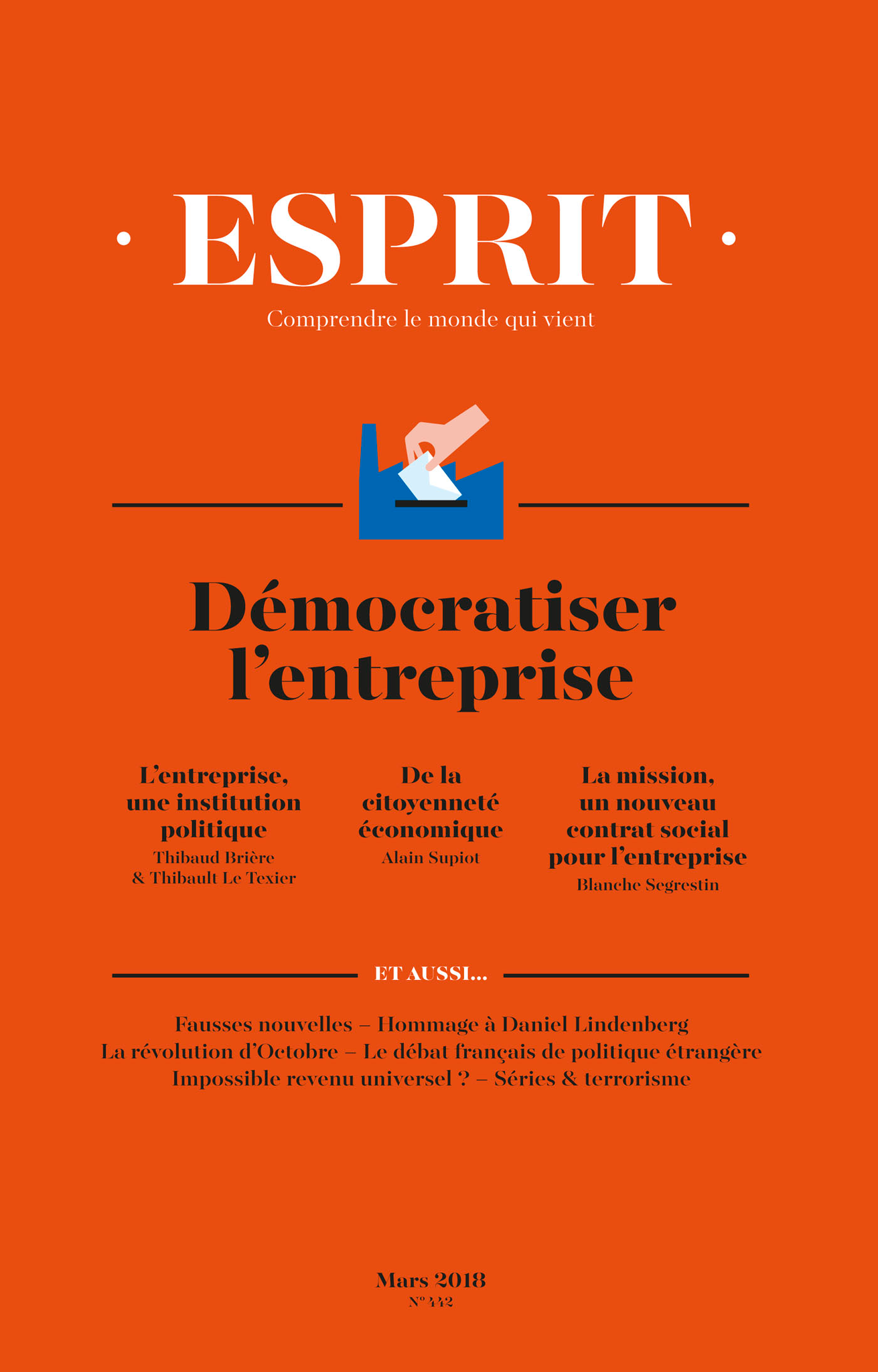
The March issue Esprit is dedicated to a paradox: we live in democratic societies, yet we spend most of our time working in hierarchical organizations. Why do we accept subordination at work, while we reject it elsewhere?
Corporate democracy: France has a long tradition of representative democracy in the workplace, above all through trade unions. Participatory democracy at work, however, has been confined mostly to anarchist circles. As Thibaud Brière and Thibault Le Texier write, corporate democracy is a way of strengthening public institutions: ‘Companies and the market can be places where citizens rediscover the meaning of democracy and recover agency in the world.’
Economic citizenship: The analogy between states and companies – as seen during the Greek crisis – reconfirms the priority of financial over collective interests, argues Alain Supiot in interview. The German model of employee participation through works councils offers a balance between the economic and the social: ‘It is this communitarian culture, and not the worsening of the situation for the unemployed and precariously employed after the Hartz reforms, that explains German economic efficiency’, Supiot proposes.
Autonomy and recognition: ‘The working climate and the degree of autonomy and recognition of the employee are major factors for health at the workplace’, argues Patrick Guiol. Managers working in firms that have experimented with democracy concur: in a series of interviews, they insist on the time-consuming challenge of building consensus among their teams but remain convinced of the virtues of democratic management for the sustainability and efficiency of the company.
Business beyond profit: Blanche Segrestin argues for a new social contract setting social, environmental, scientific or cultural missions for business. ‘Only if the commitment of the company to its mission can be controlled and contestable can companies be credible in social and environmental matters.’ A recent report on ‘business and the general interest’, co-authored by trade unionists and business leaders, also proposes redefining the status of companies: beyond profit, they should have the option of pursuing social and environmental goals.
More articles from Esprit in Eurozine; Esprit‘s website
Syn og Segn (Norway) 1/2018
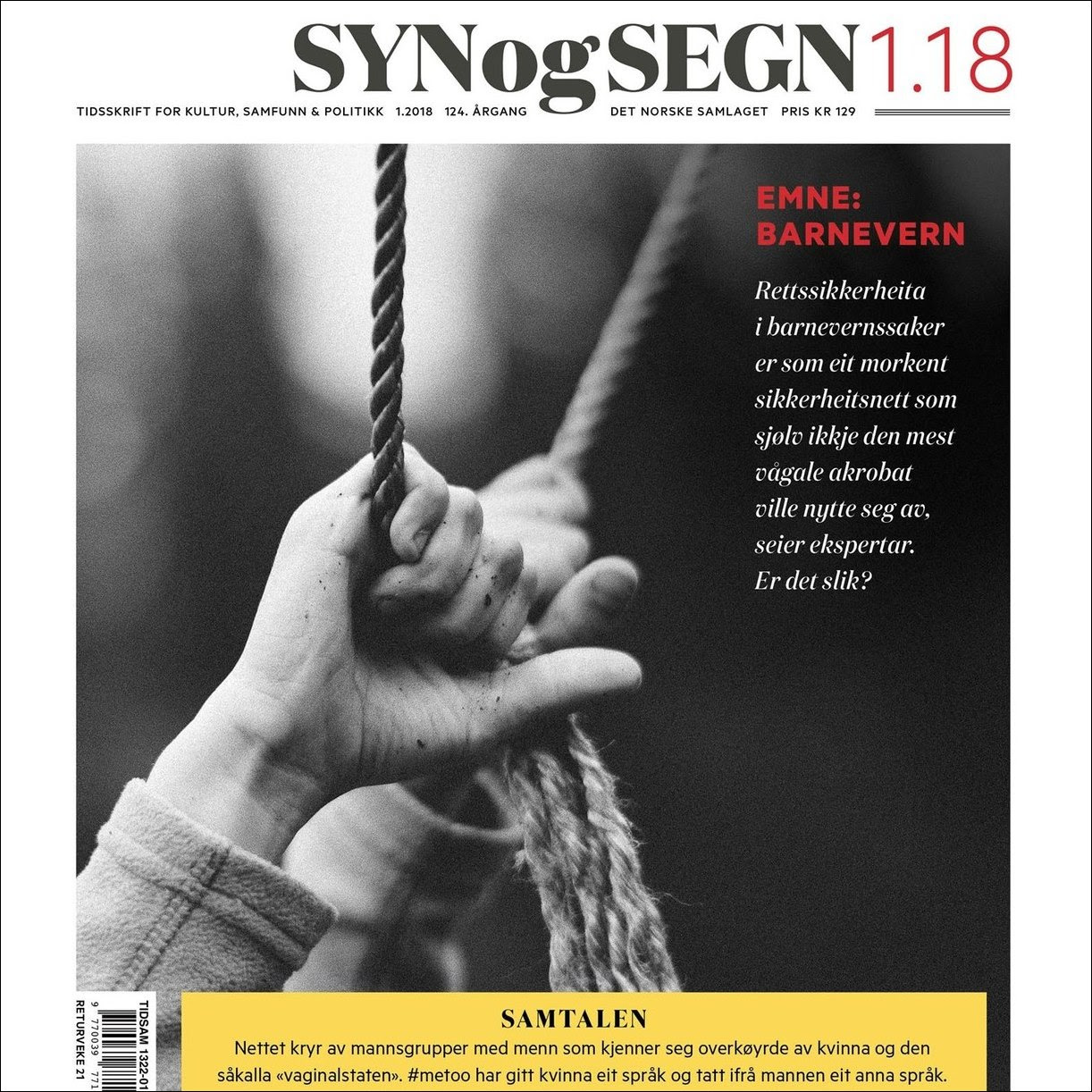
In Syn og Segn, the novelist Bergljot Kaslegard talks to the philosopher Helge Svare about the ‘crisis in gender relationships’: ‘I am particularly critical of the generalization that male and female are two categories,’ Svare comments. ‘And I don’t like to use the word crisis.’ However, men have indeed lost traditional roles and gender equality has become defined in female terms. Kaslegard and Svare agree that young men often do badly at school (which are too academic), go on to behave badly (because there are too few jobs), and eventually become depressed (men are less resilient than women). All this can only lead to ‘political polarization between modern and traditional males’, with adverse effects in the future: ‘Potentially, this threatens gender equality and liberal freedoms more generally.’
Child welfare: The European Court of Human Rights has issued a serious warning to Norway on completion of hearings in several child care cases brought in 2016 and 2017. Children had been placed in care so frequently that ‘state kidnapping’ triggered public anger. In five articles, professionals analyze the norms and practices of the Norwegian child protection system. The tone alternates between explanatory, concerned and sharply critical. Tore Nyseter, Are Svendsen andKari Killén argue that the failings are due mainly to bureaucratization and dependence on permanently contracted and therefore conformist legal and psychological expertise.
Microbiology: Micro-organisms constitute ‘an invisible majority’ says Unni Vik. We co-exist with untold billions of them and there are ten times as many bugs as mammalian species. Many are very useful, but most have unknown capacities. DNA analysis is essential to understanding micro-organisms and Vik goes on to focus on how scientists went about finding out how DNA works.
Abortion: We find it so difficult to talk about abortion because we ‘lack a language to express complex personal experience’, argues Kristin van Zijp Nilsen. She points to our conflicted morality when deciding ‘when a foetus in one’s belly becomes a [human] life’ and quotes a young medic: ‘The question is not whether we kill or not, but whether the killing is legitimate.’
Jewishness: After a spate of anti-Semitism following the second intifada, life for the small, diverse community of Norwegian Jews has become easier, says the journalist Dana Wanounou. It is important to stay aware of one’s Jewishness, and institutions matter: ‘In large countries it is much easier to hold on to a Jewish identity.’

Published 21 March 2018
Original in English
First published by Eurozine
© Eurozine
PDF/PRINTNewsletter
Subscribe to know what’s worth thinking about.


